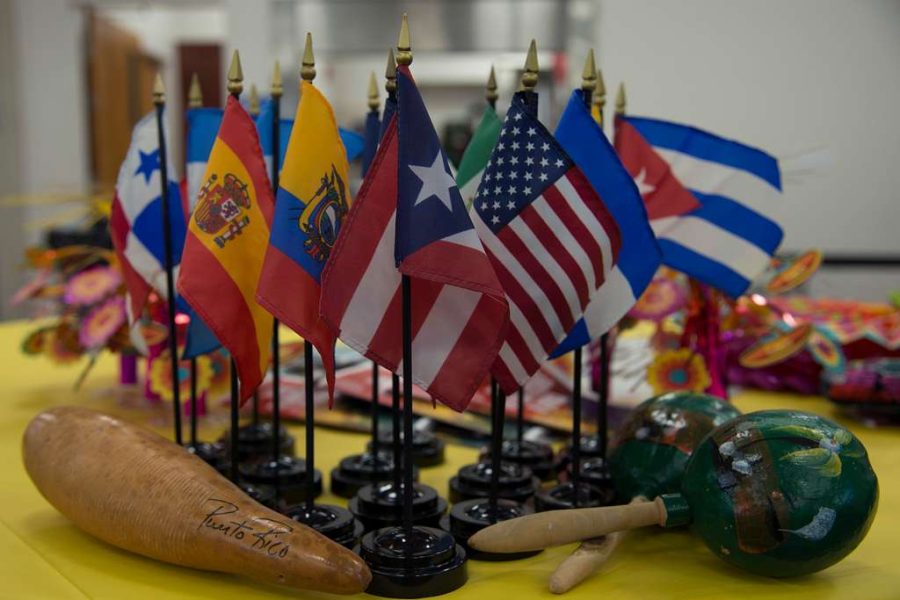Honoring Heritage: Hispanic Heritage Month
Honrando la Herencia: Mes de la Herencia Hispania
Decorations sit on a table during the National Hispanic Heritage Month luncheon. Photo Courtesy of GaryStockBridge Archives
October 12, 2022
“It’s not a month to eat tacos or wear sombreros or promote Spanish-speaking tv shows,” world languages professor Andrea Herrera-Dulcet said. “It is a month to frame and discuss narratives and Hispanic heritage in the U.S. and its contribution.”
Hispanic Heritage Month spans from Sept. 15 to Oct. 15, and includes the dates of multiple Latin American independence days and holidays. It started as Hispanic Heritage Week under Lyndon B. Johnson in 1968, and would be expanded to a month by Ronald Reagan in 1988.
Christina Torres García, a world languages professor, said she thinks it’s not enough to have a week or a month.
“Unfortunately we still have a week or a month,” García said. “We haven’t been incorporated into American history for our day to day.”
García said the reason heritage month is so important is because it’s a reminder of the contribution of the Hispanic community, especially when Hispanic representation is so low in the media and politics.
Herrera-Dulcet said the reason it’s so important to celebrate Hispanic Heritage Month is because it’s an opportunity to create spaces for Hispanic voices that otherwise go unheard.
“Brown stories, brown experiences, brown voices do not have the same media exposure as white voices do,” Herrera-Dulcet said. “It’s important to remember that, especially those upholding those white spaces need to observe and make room for these other voices.”
Citlali Gonzalez-Arroyo, the co-chair for Movimiento Estudiantil Chinana/o de Aztlan (MECHA) a Latinx organization that focuses on political issues, said that for her Hispanic Heritage Month is about family.
“My people, my parents are the reason why I’m here. They’re my heritage. They are my history,” Gonzalez-Arroyo said.
Herrera-Dulcet said she would like to see Hispanic Heritage Month move away from being centered around performance and festivities, and be more about sharing experiences.
“I received an email recently from one of the public schools here in Ellensburg asking if, for Hispanic Heritage Month, we could send some students who could dance folkloric dances or play some mariachi music,” Herrera-Dulcet said. “I would like to see Hispanic Heritage Month moving away from that more like, ‘Hey, we would like to know if you could host some talks on Latinidad, or workshops on Latinx in the U.S. educational system.’”
García also thinks that Hispanic Heritage Month is an opportunity to talk about issues that Hispanic communities are facing. One of the biggest issues García thinks needs to be discussed is immigration reform.
“I really want immigration reform to be done and over with. I want undocumented students to have a path for citizenship,” García said.
A discussion that Herrera-Dulcet said she thinks needs to be brought up more is the term Hispanic and what goes under that umbrella term. Herrera-Dulcet said that the Hispanic umbrella is broad.
“Even though this is called the Hispanic Heritage Month we really don’t have a chance to talk about all the colors, and all of the flavors, and all of the minutiae that exists in what we call the Hispanic heritage movement,” Herrera-Dulcet said. “Pointing out what makes us closer but also what makes us different, right? It’s not the same being born in Spain, or in Puerto Rico, Cuba, Miami, or in Arizona. It’s completely different stories.”
Herrera-Dulcet said that when people think of Hispanic communities they’re usually thinking of Mexico, or some other central and south American countries, but the community includes more than that. She gives the example of such Afrolatinas being an underrepresented community. Another example he gives is a region in Mexico that has a large amount of people with Chinese heritage.
According to Herrera-Dulcet, CWU is on the path to becoming a Hispanic-Serving Institution. According to the Department of Education in order to be a Hispanic-Serving Institution it has to have at least 25% of their full time students be Hispanic. Being a Hispanic-Serving Institution would give CWU access to more funding and resources to be put toward assisting their Hispanic students.
Important dates during Hispanic Heritage Month
| September 15 | Independence Day for Costa Rica, El Salvador, Guatemala, Honduras and Nicaragua |
|---|---|
| September 16 | Mexican Independence Day |
| September 18 | Chilean Independence Day |
| October 12 | Día de la Raza |



